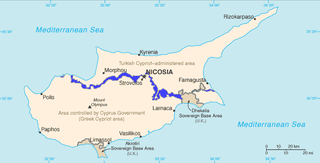
The United Nations Truce Supervision Organization (UNTSO) is an organization founded on 29 May 1948 for peacekeeping in the Middle East. Established amidst the 1948 Arab–Israeli War, its primary task was initially to provide the military command structure to the peacekeeping forces in the Middle East to enable the peacekeepers to observe and maintain the ceasefire, and in assisting the parties to the Armistice Agreements in the supervision of the application and observance of the terms of those Agreements. The organization's structure and role has evolved over time as a result of the various conflicts in the region and at times UNTSO personnel have been used to rapidly deploy to other areas of the Middle East in support of other United Nations operations. The command structure of the UNTSO was maintained to cover the later peacekeeping organisations of the United Nations Disengagement Observer Force (UNDOF) and the United Nations Interim Force in Lebanon (UNIFIL) to which UNTSO continues to provide military observers.

The United Nations Disengagement Observer Force (UNDOF) is a United Nations peacekeeping mission tasked with maintaining the ceasefire between Israel and Syria in the aftermath of the 1973 Yom Kippur War. The mission was established by United Nations Security Council Resolution 350 on 31 May 1974, to implement Resolution 338 (1973) which called for an immediate ceasefire and implementation of United Nations Security Council Resolution 242.

United Nations Security Council Resolution 1701 is a resolution that was intended to resolve the 2006 Lebanon War. The resolution calls for a full cessation of hostilities between Israel and Hezbollah, the withdrawal of Hezbollah and other forces from Lebanon south of the Litani, the disarmament of Hezbollah and other armed groups, and the withdrawal of Israeli forces from Lebanon, with no armed forces other than UNIFIL and Lebanese military south of the Litani River, which flows about 29 km (18 mi) north of the border. It emphasizes Lebanon's need to fully exert government control and calls for efforts to address the unconditional release of abducted Israeli soldiers.

United Nations Security Council resolution 866, adopted unanimously on 22 September 1993, after reaffirming resolutions 813 (1993) and 856 (1993), the council noted that United Nations involvement would contribute significantly to the effective implementation of the peace agreement in Liberia and went on to establish the United Nations Observer Mission in Liberia (UNOMIL).

United Nations Security Council resolution 1024, adopted unanimously on 28 November 1995, after considering a report by the Secretary-General Boutros Boutros-Ghali regarding the United Nations Disengagement Observer Force (UNDOF), the Council noted its efforts to establish a durable and just peace in the Middle East.

United Nations Security Council resolution 1057, adopted unanimously on 30 May 1996, after considering a report by the Secretary-General Boutros Boutros-Ghali regarding the United Nations Disengagement Observer Force (UNDOF), the Council noted its efforts to establish a durable and just peace in the Middle East.

United Nations Security Council resolution 1081, adopted unanimously on 27 November 1996, after considering a report by the Secretary-General Boutros Boutros-Ghali regarding the United Nations Disengagement Observer Force (UNDOF), the Council noted its efforts to establish a durable and just peace in the Middle East.
United Nations Security Council resolution 1291, adopted unanimously on 24 February 2000, after recalling resolutions 1234 (1999), 1258 (1999), 1273 (1999) and 1279 (1999) on situation in the Democratic Republic of the Congo, the Council expanded the United Nations Mission in the Democratic Republic of Congo (MONUC) to include additional tasks and extended its mandate until 31 August 2000.

United Nations Security Council resolution 1500, adopted on 14 August 2003, after reaffirming previous resolutions on Iraq, particularly Resolution 1483 (2003), the council established the United Nations Assistance Mission in Iraq (UNAMI) and welcomed the creation of the Iraqi Governing Council.
United Nations Security Council resolution 1520, adopted unanimously on 22 December 2003, after considering a report by the Secretary-General Kofi Annan regarding the United Nations Disengagement Observer Force (UNDOF), the Council extended its mandate for a further six months until 30 June 2004.
United Nations Security Council resolution 1535, adopted unanimously on 26 March 2004, after reaffirming resolutions 1373 (2001), 1377 (2001) and 1456 (2003), the council restructured the Counter-Terrorism Committee to enhance the implementation of anti-terrorism measures.

United Nations Security Council Resolution 1821 was unanimously adopted on 27 June 2008.

United Nations Security Council Resolution 2026 was unanimously adopted on 14 December 2011.
The Kofi Annan peace plan for Syria or the six-point peace plan for Syria was launched in March 2012 by the Arab League and the United Nations (UN), when the violent Syrian conflict or civil war had raged for a year.

United Nations Security Council Resolution 2042 was unanimously adopted on 14 April 2012.

The United Nations Supervision Mission in Syria (UNSMIS) was a United Nations peacekeeping mission in Syria, set up in 2012 as a result of United Nations Security Council Resolution 2043 in response to the Syrian Civil War. It was commanded by Norwegian Major General Robert Mood until 20 July 2012 followed by Lieutenant General Babacar Gaye from Senegal. Although observers remain in the country, Mood suspended their mission on June 16, 2012, citing "escalating violence". Observers will conduct no further patrols and stay in their current positions until the suspension is lifted. On 20 July 2012, the Security Council extended UNSMIS for a final period of 30 days. According to resolution 2059, the Council would only consider more extensions in the event that the Secretary-General reports and the Security Council confirms the cessation of the use of heavy weapons and a reduction in the level of violence sufficient by all sides to allow UNSMIS to implement its mandate.

United Nations Security Council Resolution 2059 relating to United Nations Supervision Mission in Syria was unanimously adopted on 20 July 2012.

The destruction of Syria's chemical weapons began on 14 September 2013 after Syria entered into several international agreements which called for the elimination of Syria's chemical weapon stockpiles and set a destruction deadline of 30 June 2014. Also on 14 September 2013, Syria acceded to the Chemical Weapons Convention (CWC) and agreed to its provisional application pending its entry into force on 14 October. Having acceded to the CWC, the Organisation for the Prohibition of Chemical Weapons (OPCW) Executive Council on 27 September approved a detailed implementation plan that required Syria to assume responsibility for and follow a timeline for the destruction of Syrian chemical weapons and Syrian chemical weapon production facilities. Following the signing of the Framework Agreement on 14 September 2013 and after the OPCW implementation plan, on 27 September the United Nations Security Council unanimously adopted Resolution 2118 which bound Syria to the timetable set out in the OPCW implementation plan. The joint OPCW-UN mission was established to oversee the implementation of the destruction program.

United Nations Security Council Resolution 2118 was adopted unanimously on 27 September 2013, in regard to the Framework for Elimination of Syrian Chemical Weapons during the Syrian civil war. It recalled United Nations Security Council Resolutions 1540, 2042 and 2043 and occurred on the sidelines of the General debate of the sixty-eighth session of the United Nations General Assembly. Under the Resolution, Syria had until mid-2014 to destroy its chemical weapons arsenal; and the Resolution also outlines plans for a transition. Despite a few hiccups, the OPCW reported that the destruction was largely on schedule.














